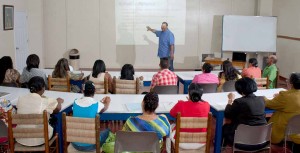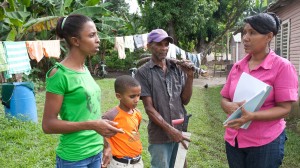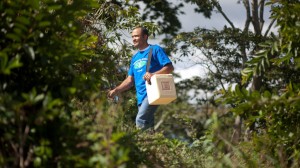The Rural Health ‘Cooperador’ is a person chosen by each community, for their active participation and leadership, with the intention of coordinating the efforts intended to achieve improved health for the members of their respective communities. The candidate must reside in the community for which they work, be between 20 and 50 years old, know how to read and write, avail their free time to complete the tasks assigned, be available to volunteer without remuneration and have leadership skills.
Training and Development for ‘Cooperadores’
 Chosen by the community, the ‘Cooperador’ should complete the process of training and development. The training is done at the facilities on the campus of the Mision ILAC, where a team of professionals in both health education and social sciences prepare them to better understand the community dynamics, and improve the ability of the communities to plan and respond to needs and emergencies.
Chosen by the community, the ‘Cooperador’ should complete the process of training and development. The training is done at the facilities on the campus of the Mision ILAC, where a team of professionals in both health education and social sciences prepare them to better understand the community dynamics, and improve the ability of the communities to plan and respond to needs and emergencies.
 The education of the ‘Cooperador’ is continuous and directed. Dealing with themes of permanent interest to the community as well as focusing on and analyzing new developments in health education and prevention. Their training consists of eight stages of development in the areas of: professional development, leadership, health, basic nursing, newborn and maternal care, child and adolescent development, women’s healthcare, adult illness, hygienic environment, first aid and awareness of health issues. These issues are addressed in the contents of an instructive and informative manual prepared by the health professionals at Mision ILAC, for a more effective learning process.
The education of the ‘Cooperador’ is continuous and directed. Dealing with themes of permanent interest to the community as well as focusing on and analyzing new developments in health education and prevention. Their training consists of eight stages of development in the areas of: professional development, leadership, health, basic nursing, newborn and maternal care, child and adolescent development, women’s healthcare, adult illness, hygienic environment, first aid and awareness of health issues. These issues are addressed in the contents of an instructive and informative manual prepared by the health professionals at Mision ILAC, for a more effective learning process.
Services and Outreach in the community for the ‘Cooperador’
 The ‘Cooperador’ is a volunteer who dedicates part of their time to promote health education among the families of their community through lectures, immunization programs, de-worming assistance, gynecology education, environmental education, first aid, pre-natal assistance, assistance to the elderly, supervision for epidemiological diseases and diabetes, among others. Also offering first aid in the case of injuries, fractures, etc., accompanying the patient to the health center, and they also help to select, together with the Health Committee, the persons most in need for inclusion in the surgical programs that are performed by the Mision Ilac various times a year.
The ‘Cooperador’ is a volunteer who dedicates part of their time to promote health education among the families of their community through lectures, immunization programs, de-worming assistance, gynecology education, environmental education, first aid, pre-natal assistance, assistance to the elderly, supervision for epidemiological diseases and diabetes, among others. Also offering first aid in the case of injuries, fractures, etc., accompanying the patient to the health center, and they also help to select, together with the Health Committee, the persons most in need for inclusion in the surgical programs that are performed by the Mision Ilac various times a year.
Our network encompasses 130 communities where ILAC has a presence with programs, all of which are assisted by a ‘Cooperadores’. As well as providing periodic training, Mision ILAC has prepared an educational manual that is the first resource to the ‘Cooperador’ in the field. Detailed in the manual are a considerable number of alternatives to resolve situations that have been previously analyzed and cataloged by the medical team at ILAC Mission.